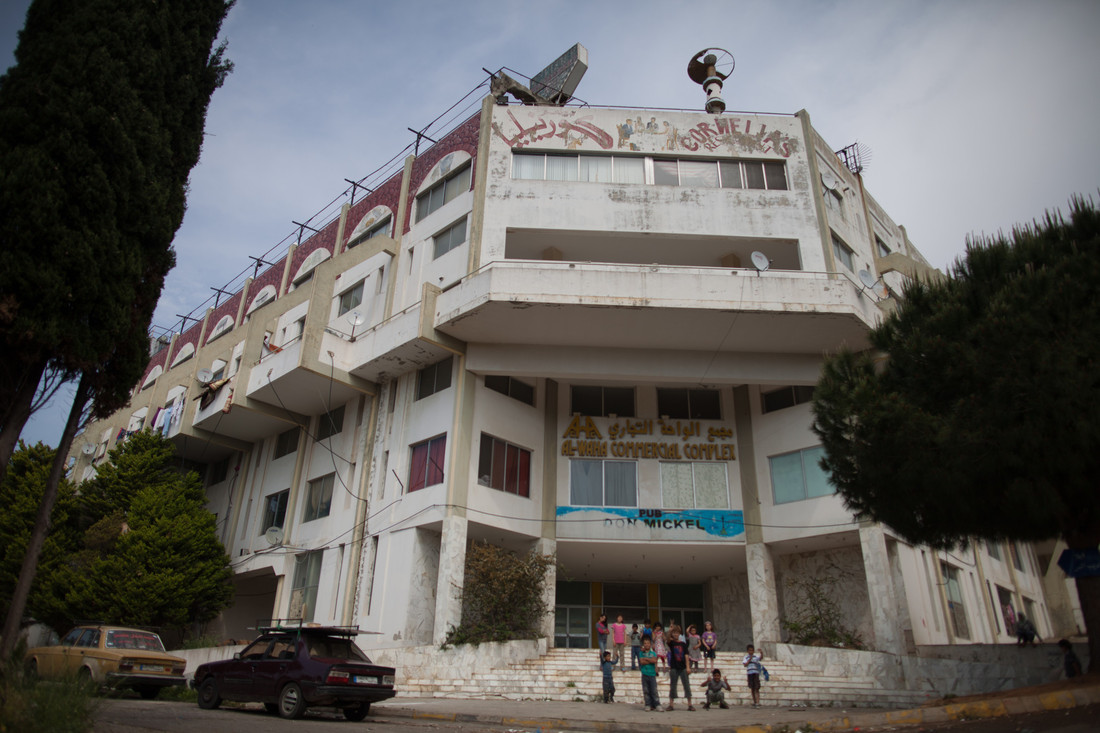The shopping mall that’s now home to 400 Syrian families

Oxfam America’s president Ray Offenheiser, director of humanitarian response Mike Delaney, and director of media Matt Herrick are in Jordan and Lebanon this week, visiting Oxfam’s efforts to help refugees from the conflict in Syria.
Along a quiet village road in Lebanon that climbs against a steep cliff jutting over the Mediterranean Sea is a shopping mall filled with Syrian families. But the people crammed into this white, boxy building are not shoppers or carefree people-watchers—they are refugees. Each day, their numbers grow as the daily horrors of Syria’s staggering humanitarian crisis further undermine the region’s stability.
When Oxfam visited this island in the sky two months ago to deliver clean water, healthy sanitation services, and cash assistance, roughly 100 families called the open-air mall home. When I visited on Wednesday, the mall had become a refuge for 400 families, or about 2,000 people.

An abandoned commercial building, while it does provide shelter and some level of security, is not a suitable home for a family. There is limited running water, just a handful of bathroom facilities, and little access to public services. Who comes to pick up the trash when 2,000 people fill an abandoned shopping mall? Who pays the electric bill? How can a family send their children to school or find a livelihood to provide for basic needs? Where do you buy soap or bread? And when your child is lying in your overcrowded 12-by-12-foot stall-turned-apartment, too sick and weak to open her eyes because of diarrheal disease, how do you transport her the 20 miles to the nearest hospital?
I left the mall with more questions than answers. The humanitarian crisis facing Syria and its neighbors is nowhere near an end. Instead, sadly, much of the world is only just realizing the high cost of this crisis—more than 100,000 dead, nearly 7 million displaced and vulnerable inside Syria, another 2 million pushed across the Syrian border to seek asylum.
There is a single and enormous question about this humanitarian response that has not been given a shred of attention by the international community—namely, is the response sustainable?
More than one-quarter of Lebanon’s population is made up of Syrian refugees who have arrived in just the past year or so. Could the United States assume responsibility for millions of Canadians without an impact on its economy, society and stability? Of course not.
Yet, the world shrugs at Lebanon and Jordan when they open their borders, economies, and services to Syrians. Shouldn’t we—the development and humanitarian community—have tested, long-term plans for this sort of crisis so that minimal strain is placed on nations accepting asylum seekers? After walking through the urban refugee slums of Amman and Beirut, the informal tent communities wedged between industrial complexes, and the ramshackle huts dotting rural landscapes, I wonder how many refugees are slipping through the cracks, unregistered, unable to access UN assistance and shut out from municipal services. I met hundreds. How many more are out there, scraping by in this gray area?
Yet, while the Syrian people continue to suffer and the region absorbs a flood of humanity yet again, world leaders are marshaling military might, rather than marshaling the will to do the hard work of diplomacy that will bring the bloodshed to an end.
As a humanitarian and advocacy organization, our job is to save lives, bear witness and advocate on behalf of the poor and suffering. The global community may just be waking up to the crisis in Syria, but this tragedy has been unfolding for more than two years. The urgency of the humanitarian situation in Syria must drive world leaders, including presidents Obama and Putin, toward a political resolution.
Until then, how many more families must take refuge in shopping malls?
Make your voice heard: Write to your members of Congress now and ask the US to help pursue a peaceful, political solution to end the bloodshed in Syria once and for all.